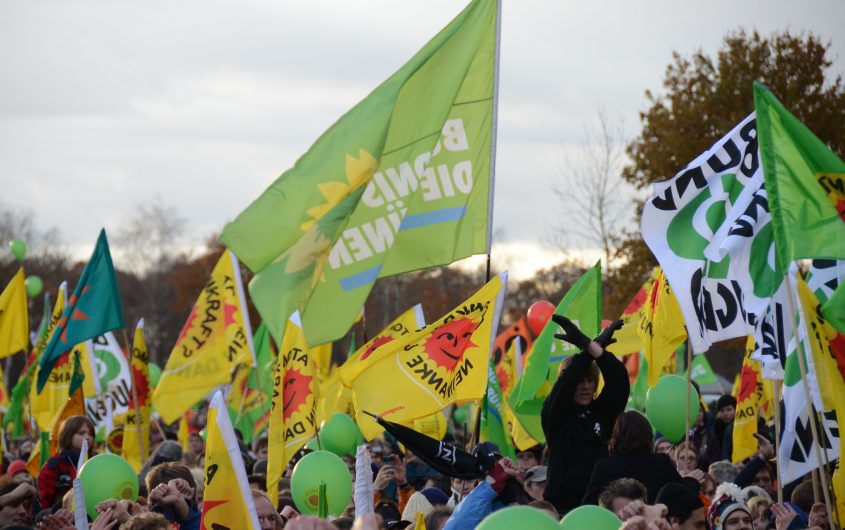
Bündnis 90/Die Grünen NRW via Flickr
Atomkraft: Jein

Mason Kane
Mr. Mason Kane is an AICGS-Halle Foundation intern for the 2022 fall semester. He assists resident fellows with their research projects, organizes databases, and contributes to the organization and documentation of AICGS events. He is pursuing an MA in German and European Studies at Georgetown University's School of Foreign Service. His research interests are in European security, transatlantic policy, humanitarian mediation, migration, and German culture.
Mr. Kane is a CBYX Scholar and a graduate of Kennesaw State University with a double degree in International Affairs and German Studies. During his undergraduate studies, Mr. Kane also studied language and culture at Universität Paderborn.
The Greens’ Identity Crisis in the Age of Nuclear Energy Expansion
The Green Party (Die Grünen) in Germany evolved from a wave of social movements that began with student protests in 1968 and culminated with environmentalists, pacifists, and anti-nuclear activists, creating a people’s party (or Volkspartei). “Atomic Energy: No Thanks” was the initial slogan of the Green Party movement in 1975, but it has since become synonymous with the party and a symbol for nonproliferation. By 1983, the Greens’ message and movement had acquired credibility as a part of the political establishment in Bonn, garnering 5.6 percent of the national vote and entering the Bundestag. However, German Reunification in 1990 and the subsequent federal election revealed that it was difficult for the Greens to build a national platform that appealed to East Germans; they did not meet the five percent threshold to enter the Bundestag. The Green Party came to government in 1998 in coalition with the Social Democrats with 6.7 percent representation.
In 2000, the Greens accomplished what the political movement had initially intended by introducing the plan for energy nonproliferation. As a result, the last three nuclear power plants were on track to entirely retire the German energy market by the end of 2022. The harsh reality of government, though, is that compromise is inevitable. At the turn of the millennium, the Green Party’s pacifism clashed with Germany’s participation in NATO’s bombing campaign against Serbia, causing Joschka Fischer, Green foreign minister, to face significant divisions within the party. The party’s pragmatic ‘realo’ faction, led by Fischer, ultimately won because most of the party supported German participation in NATO airstrikes. As a result, the party could fulfill its governance responsibilities. However, it did so at the price of several members, who resigned because the Greens valued responsibility over principle while representing the German people and not just their party. Due to social difficulties, especially Chancellor Gerhard Schröder’s decision to reduce welfare payments,[1] the Greens would ultimately lose their government position the following election cycle. Therefore, Angela Merkel’s Grand Coalition (GroKo) of the SPD and CDU would prolong the nuclear phase-out in the absence of Greens in the governing coalition. Ultimately, the 2011 Fukushima nuclear disaster cemented the Merkel government’s position on phasing out nuclear energy, despite the fact that doing so would make it more challenging to cut greenhouse gas emissions in the short term.
Germany had been a significant consumer of Russian energy for decades before the Greens joined the government. Despite the warnings of energy dependency, the Schröder and Merkel governments pushed for Germany and Russia’s closer cooperation with the Nord Stream pipelines completed in 2011 and 2021. As of December 2021, Russia was Germany’s largest supplier of pipeline gas. In February 2022, Russian forces invaded Ukraine, killing thousands and displacing millions. It also complicated the broader relationship between Germany’s consumption of Russian energy, the purchase of which was implicitly financing the war of aggression in Ukraine. The Russian invasion and the weaponization of Russian energy have compelled the Greens to tackle an unspoken taboo: nuclear energy use to ease the transition into renewables and energy independence.
The Russian invasion and the weaponization of Russian energy have compelled the Greens to tackle an unspoken taboo: nuclear energy use to ease the transition into renewables and energy independence.
Extending the operations of Germany’s three remaining nuclear facilities for a limited time presents a challenge to the Green Party, which is striving to show a unified front in the discussion over whether the reactors are a viable option in the current energy supply situation. Nevertheless, some members of the Green Party are amenable to a limited extension that “stretches” the usage time of present fuel rods but excludes the purchase of new ones.
Concerns about gas scarcity have intensified due to Russia’s continued reductions in gas deliveries, which has sparked a crisis of identity among environmentalists and climate activists because they see the Ukraine conflict as a fossil-fueled war, stressing the urgency to decouple from the current system. The degree to which nuclear power could assist in resolving the current problem, given that only 12 percent of natural gas in 2021 was used for power generation (the majority is used for industry and heating houses). The Green Party, one of three federal coalition parties, accepted German Economy Minister and Green Party co-leader Robert Habeck’s proposal to maintain two nuclear power plants on standby until April 2023 in the event of a winter energy shortfall. The party congress voted to keep the Isar II and Neckarwestheim II nuclear power plants functioning until April 15 as emergency reserves. The third surviving nuclear reactor in Germany, Emsland, was set to close at the end of 2022 as previously planned, but it ultimately was also extended to operate until April 2023.
Nevertheless, this is still a subject of contention within the federal administration. New plans allow the nuclear power stations to remain in “operational reserve” until April 2023 in case of an undefined emergency. That is, industrial operations will not continue as usual.
During this last Green Party conference in September 2022, in response to the energy crisis, the Greens placed a new red line in their concession, stating that the extension of the power plant’s life is only conceivable if no fuel rods are bought to extend the life past its new expiration date. Habeck regards a return to nuclear power as fundamentally “wrong,” telling party delegates, “There’s no way that’s going to happen to us.” Nonetheless, he remained committed to the Greens’ objectives of denuclearizing Germany’s energy market while prioritizing an efficient approach to the energy crisis. However, to better serve the German people, Habeck abandoned these Green values while ignoring the pacifist, environmentalist, and anti-nuclear activists who gave rise to the Greens’ current power and appeal in German politics. The issue has also placed the economic and climate minister in a difficult position with the party base, given the Green Party’s long-standing opposition to nuclear power and its pride in being a part of the first government to declare that Germany would stop using nuclear power entirely.
Green Party members and climate activists see the initial slogan of “Atomkraft: Nein Danke” (nuclear power: no thanks) as sacred to the climate movement and foundational to the Green Party’s claim of being a Volkspartei. The decision to extend the existing nuclear power plants comes when 86 percent of Germans support nuclear energy extension. However, this does not necessarily indicate that most Green voters support this decision to continue nuclear energy. Yet, the move by Habeck to extend the power plants reveals four key things:
- The Green Party is truly a people’s party when the vast majority of Germans are in favor of energy expansion. If Greens were to take a stricter stance on their nuclear energy principles, there could be an energy shortage. The Greens would be blamed for willingly causing a blackout and would ground the rising popularity of the Greens.
- There is a continuity of Green leadership within the federal government. Like the compromises it made in 2000, the party is meeting its responsibility to ensure energy security, ultimately coming at the cost of misrepresenting those who voted the Greens into the position they are in today.
- The Greens at the federal, state, and local levels have an identity crisis. Some Green Party groups at the state level, for example, in Bavaria and Thuringia, signaled they would accept a limited nuclear power extension in case of another gas shortage. In contrast, other state parties, for example, in Lower Saxony, wholly rejected the idea. This comes at a time where state governments and parliaments have increasingly more Green Party representation but, at the federal level, display disunity among the party on this issue. Bremen, Bayern, Schleswig-Holstein, and Hessen all have upcoming state elections in 2023, suggesting that this issue of nuclear energy may become a factor in determining governing power at the state level.
- The extension of nuclear power plants jeopardizes the social consensus of the existing nuclear phase-out by the end of 2022.
Similar to their internal struggles in the early 2000s, the Green Party finds the nuclear dilemma difficult to stomach. The anti-nuclear movement is central to the Green Party’s identity and served as a critical impetus for the party’s formation. Habeck proposes to delay at least the nuclear phase-out, which is only one of several compromises his party has had to make in the first few months of the coalition, like the shipment of arms to Ukraine and the provision of gasoline subsidies. The Greens might be disturbed by another compromise. “But,” according to Habeck, “we will never mix up what the problem is and what the remedy is. The issue is with fossil fuels and nuclear power.”
Until the next cycle of federal elections, it is impossible to predict whether this political setback for the Green Party will affect its rising popularity. Nonetheless, if one thing is sure, the Green Party’s motto will need to be modified to the tune of “Atomic Energy? Maybe just this once.”
[1] “Schröder gets his way by losing,” The Economist, July 5, 2005.








